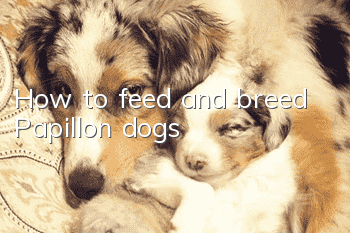How to feed and breed Papillon dogs

The juvenile period is the stage with the fastest growth and development, the easiest time to cultivate, and the highest number of morbidities and deaths. Therefore, at this stage we must understand the growth and development patterns and physiological characteristics of puppies and provide them with scientific care. The young period is the main stage of growth and development of dogs. The body grows rapidly, so sufficient nutrition must be provided.
Puppies after weaning often appear restless and prone to illness due to sudden changes in living conditions. At this time, you should choose food that is nutritious, tastes good, and is easy to digest. Puppies under 3 months old should be fed at least 3-4 times a day. You can use the method of feeding less often. Feeding less and frequently can make puppies always feel not full. You won’t get bored or picky about food. Puppies aged 4-6 months have increased food intake and rapid weight gain, and the amount of daily feed required also increases, and they should be fed at least 3 times a day. Dogs after 6 months old can be fed twice a day.
Papillon
The diet of a newly purchased puppy should be fed according to the diet of the original dog owner first, and then gradually changed. The gastrointestinal function of puppies under 2 months is not very strong, so dog food should be soaked until soft and fed. If there are no conditions, you should also feed porridge, soy milk and add appropriate amounts of chopped fish, meat and chopped and cooked vegetables. Do not feed milk. If you must supplement breastfeeding, you should try to use special dog milk powder or high-calcium skimmed milk powder.
Puppies after 2 months old can use special puppy food. In order to reduce the cost without affecting the nutrition of puppies, organs such as pig, cow, and chicken lungs can be cooked and chopped, mixed with vegetables, cornmeal and other cooked foods, and then fed to dogs. This is economical and good for dogs. Love to eat. Do not feed your dog too much meat. Not only will too much meat not make the dog strong, but it will cause indigestion, difficulty in absorption, and diarrhea. Although meat contains a lot of protein, it contains less vitamin A, vitamin D, vitamin E and iodine. At the same time, meat contains less calcium and more phosphorus. Eating meat for a long time can easily cause bone formation disorders in puppies due to an imbalance in the calcium and phosphorus ratio. prone to breakage or lameness. It is best to let the dog drink some glucose water (1 tablespoon of glucose powder, add an appropriate amount of clean water) after each daily exercise. Puppies’ feed should be supplemented with calcium and vitamins, such as calcium tablets and multivitamins.
Puppies are full of energy, jumping around, and the physical energy they consume is far different from that of human BBs. Therefore, protein is the most important nutritional requirement for puppies. Protein can develop muscles and fibers in puppies. But these proteins must be easily absorbed, not just eating too much. As a smart pet owner, you must be aware of high-quality dog food, because the nutrients your puppy eats and absorbs during its growth period will affect its future health. Puppies have small stomachs. If they are fed low-quality food, they will become full quickly and fail to absorb the nutrients they should. On the contrary, by feeding high-quality food, the puppy can absorb the protein it deserves and will not become overweight or fat due to excessive food intake. Balanced nutrition is very important. In addition to protein, calcium and starch contribute to the healthy development of puppies.
Many owners think that they should keep giving food to their childrenDogs (commonly known as Gufeiqu) will make puppies stronger. In fact, this is a very wrong concept. Too much will cause the puppy's skeleton to develop too quickly, leading to structural deformity of the skeleton. And low-quality food will only make puppies fat and loose muscles. Puppies that are overweight are more likely to suffer from heart and kidney diseases as adults. High-quality and balanced nutrition will not only make puppies' muscles strong, but also make their coats beautiful, smooth and shiny. Good gastrointestinal function will also reduce bad breath and body odor in puppies. Wise owners, please remember that if you skimp on dog food and other nutritious foods today, you will spend more on veterinary care and other treatments tomorrow.
Papillon dogs are not picky about food, but their nutrition must be comprehensive, especially protein and vitamins. Papillon dog feed can be divided into three categories: animal feed, plant feed and additives. Newborn puppies are very weak, and breeders must observe them at all times to prevent the mother dog from crushing the puppies. The puppies can suck milk on their own after birth, but the weak puppies need to be placed on the mother's chest to help her suck milk. Female dogs have 8-10 nipples, and their ability to nurse puppies is limited. Large female dogs can nurse 10 puppies. If the number is too large, foster care or artificial feeding should be considered to ensure the healthy growth of the puppies.
Puppies generally refer to Papillon dogs that are 60 days to 3 months old. During this stage, due to weaning and changes in the living environment of puppies, it is often easy to cause mental and behavioral restlessness and loss of appetite. At this time, careful care must be taken. Feed three times a day. Calcium powder and vitamins should be supplemented in the food. At the same time, special attention should be paid to preventing a few puppies from overeating. The daily feeding amount should depend on the size of the dog. It is not suitable to overfeed. It is better to be full and feed each puppy about 150 ml of drinking water. Arrange an appropriate amount of outdoor exercise and ultraviolet radiation every day, which is beneficial to the absorption of calcium and the growth and development of bones.
Young dogs generally refer to Papillon dogs that are 3 to 6 months old after birth. Young dogs are already able to live independently. Feeding can be changed to twice a day. Feeding must be timed, quantitative, qualitative and temperature-controlled, and care must be taken when eating. At this time, the young dog's canine teeth have grown and it likes to chew. You can throw some bones in for it to chew. Dog groups should be separated according to strength, and young dogs that love fighting should be selected and placed in the group of older dogs to avoid group bites and losses. Breeding dogs have higher nutritional needs. Generally, in addition to feeding in the morning and evening, they also need to be fed once in the middle. To ensure the daily activity level of breeding dogs, they should be active in large activity venues 2 to 3 times a day, for about 30 minutes each time. This can not only ensure the quality of the male dog, but also enhance the physical fitness of the female dog.
- Why do golden retriever dogs lose hair?
- Targeted training at the dog agility obstacle course! A must-see for pet owners!
- Causes, symptoms and treatments of eczema in dogs
- What medicine can be taken to treat diarrhea in dogs?
- Can dogs eat soaked rice?
- How to deal with pseudopregnancy in dogs? Prevention and treatment measures for pseudopregnancy in dogs!
- Running out of pet food? Pet nutrition expert teaches you homemade first aid
- How should pet owners identify inferior freeze-dried products?
- How much does a Mongolian Shepherd Dog cost and is it easy to raise_Training|Pictures
- What's wrong with the dog's limbs being weak and lack of energy?



